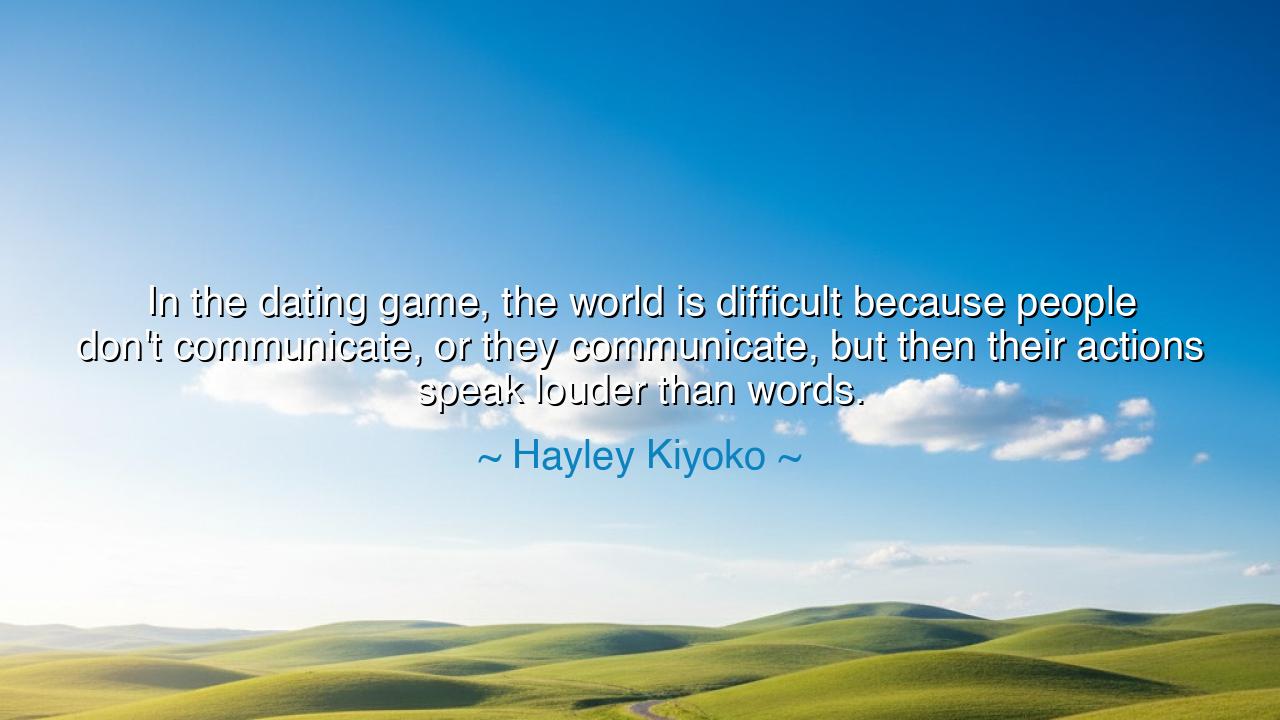
In the dating game, the world is difficult because people don't
In the dating game, the world is difficult because people don't communicate, or they communicate, but then their actions speak louder than words.






In the heartfelt and discerning words of Hayley Kiyoko, artist and seeker of emotional truth, we hear a lament as old as human longing: “In the dating game, the world is difficult because people don't communicate, or they communicate, but then their actions speak louder than words.” Though she speaks in the language of modern romance, the essence of her message belongs to all ages. It is a cry against the great divide between speech and sincerity, between what is said and what is lived. In love — that most delicate and powerful of human endeavors — honesty must not end at the tongue; it must flow through the heart and take shape in action. Kiyoko reminds us that to love rightly, one must not only speak truth but embody it, for the soul hungers not for promises, but for proof.
Hayley Kiyoko, a voice of her generation and a champion of authenticity, speaks from the terrain of real emotion. Her words arise from the dissonance of modern relationships, where communication often means mere words exchanged through glowing screens, where declarations of affection too easily dissolve into inconsistency. Her lament is not cynical — it is observant, wise, and compassionate. She understands that people are rarely cruel by intention; they are lost, distracted, or afraid. The “dating game” she names is not a contest of hearts, but a symptom of a deeper struggle — the inability of many to align their inner truth with their outward behavior. In this sense, her insight transcends romance and becomes a universal principle: that peace in any human connection is born only when word and deed move as one.
The ancients, too, wrestled with this eternal contradiction. In the teachings of Confucius, harmony in human life depends upon the integrity of language. “When words lose their meaning,” he warned, “people lose their freedom.” And in the dialogues of Socrates, truth is not something one proclaims, but something one lives — an unbroken unity between the soul’s knowledge and the body’s actions. Thus, when Kiyoko observes that actions “speak louder than words,” she echoes a wisdom older than empires: that the heart of communication lies not in speaking more, but in being true. To speak falsely, or to speak without intention of follow-through, is to sow confusion not only in others but within oneself.
History gives us many examples of this fracture between word and action. Consider the tragic story of Antony and Cleopatra. Their love was proclaimed in the grandest gestures, their words overflowing with poetry and promise. Yet when faced with the demands of duty and empire, Antony faltered, his actions betraying the very passion he had sworn eternal. The result was ruin — not merely of two lovers, but of nations. Their tale stands as a monument to this truth: that words, when unanchored in deed, build palaces of illusion that crumble beneath the first winds of consequence. So too in our time, Kiyoko’s insight warns us — where there is speech without sincerity, affection without effort, the foundation of love cannot stand.
But there is also tenderness in her reflection. She does not condemn humanity for its contradictions; she mourns them, and in mourning, she invites healing. Her quote is not a judgment, but a call — a plea for conscious love, for relationships built upon presence and accountability. For she knows that to “communicate” is not simply to speak, but to connect, to share truth in a way that transforms both speaker and listener. To say “I love you” is easy; to live “I love you” — to show it through consistency, care, and courage — is the work of the noble heart. In this sense, she speaks like the sages of old: urging us to transform love from a transaction into a practice of truth.
And what, then, is the path she implies? It begins with awareness. To love rightly, one must first be honest with oneself — to know what one feels, what one can give, and what one truly seeks. For only those who are clear within can communicate clearly without. Next comes integrity — the alignment of word and deed, of promise and practice. If one says they care, they must act with care; if one commits, they must remain steady even when comfort fades. For love that is not proven in difficulty is not yet love, but desire dressed in illusion.
Thus, the lesson of Hayley Kiyoko’s wisdom is simple but eternal: speak less, live more truly. Let your words be few but steadfast, your affections deep but consistent. In a world of noise, sincerity becomes sacred. When you say “I love,” mean it; when you promise, fulfill it; when you err, admit it. For the power of love lies not in what we declare, but in what we demonstrate. Let your actions sing where your voice cannot reach — and let your truth be written, not merely spoken, upon the hearts of those you meet.
And so, her words echo through the ages as both counsel and challenge: that in love, as in life, authenticity is the highest form of beauty. The world may remain difficult, as she says — but where words and actions become one, where hearts learn to speak not with their lips but with their lives, there the difficulty dissolves into harmony. For love, in its truest form, is not a game at all — it is a sacred language, spoken best by the soul that lives its truth aloud.






AAdministratorAdministrator
Welcome, honored guests. Please leave a comment, we will respond soon